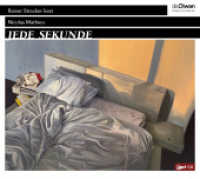- ホーム
- > 洋書
- > 英文書
- > History / World
Full Description
Weimar Germany is often remembered as the ultimate political disaster, a democracy whose catastrophic end directly led to Adolf Hitler's rise. Invisible Fatherland challenges this narrative by recovering the nuanced and sophisticated efforts of Weimar contemporaries to make democracy work in Germany-efforts often obscured by the Republic's eventual collapse. In doing so, Manuela Achilles reveals a unique form of constitutional patriotism that was rooted in openness, compromise, and the capacity to manage conflict. Authoritative yet accessible, Invisible Fatherland contrasts Weimar's pluralistic democratic practices with the rigid tendencies in contemporary thought, including Rudolf Smend's theory of symbolic integration and Karl Löwenstein's concept of militant democracy. Both theories, though influential, restrict the positive potential of open, conflict-driven democratic processes. This study challenges us to appreciate the fundamental fluidity and pluralism of liberal democracy and to reflect on its resilience in the face of illiberal and authoritarian threats-an urgent task in our time.
Contents
List of Figures page; Acknowledgments; Prologue: Weimar Democracy Now and Then - A Perspective from Charlottesville; Introduction: Toward a New Paradigm of Weimar Democracy Studies; 1. From Kaiserreich to Reich; 2. 'Onwards over Graves'; 3. Symbolics of Shared Hegemony; 4. Anchoring the Nation in the Democratic Form; 5. Political Violence and the Inversion of Gewalt; 6. In Memoriam of Walther Rathenau; 7. Constitutional Patriotism Avant la Lettre; 8. Memory from Fragments; Conclusion: The Weimar Condition and Nazism; Bibliography; Index.








